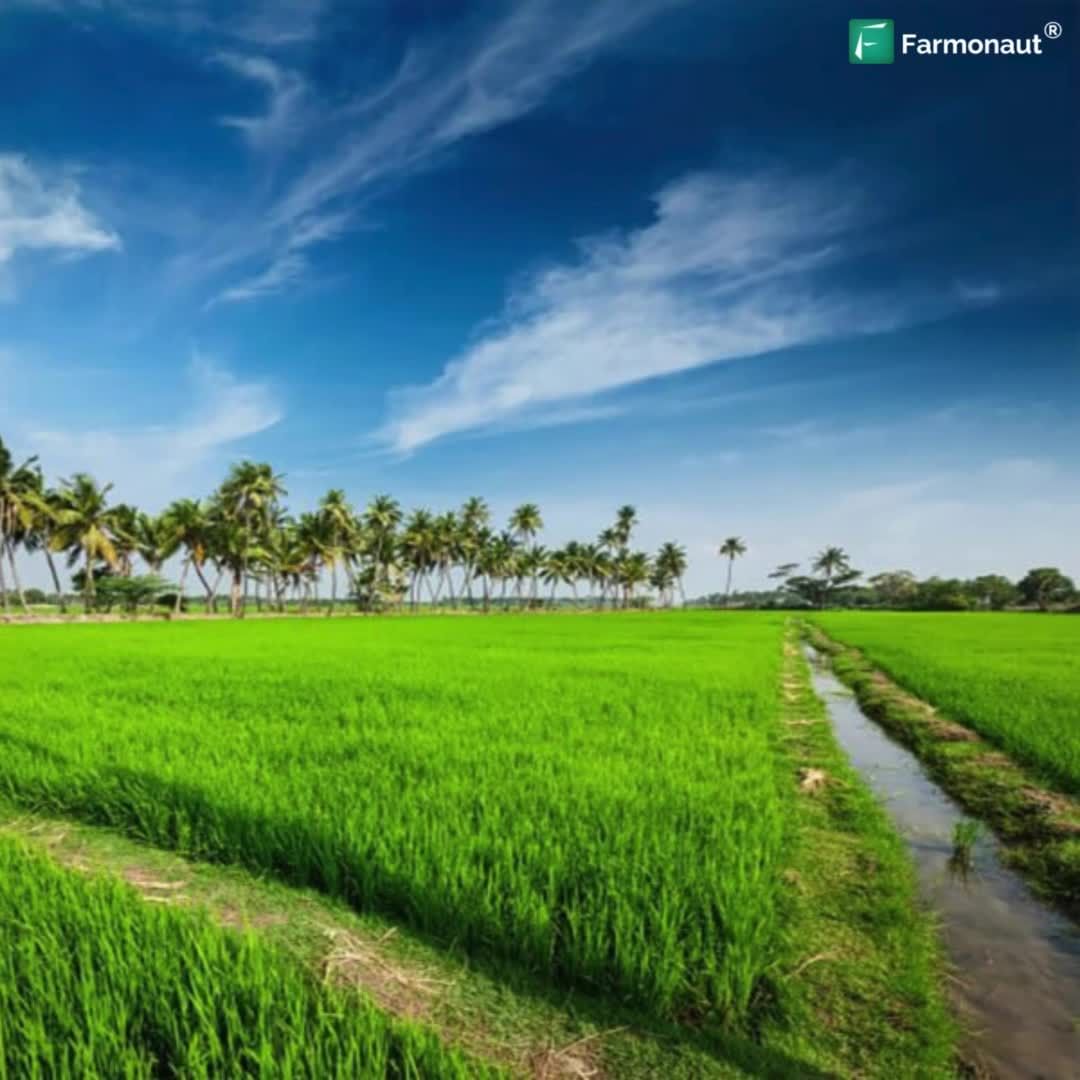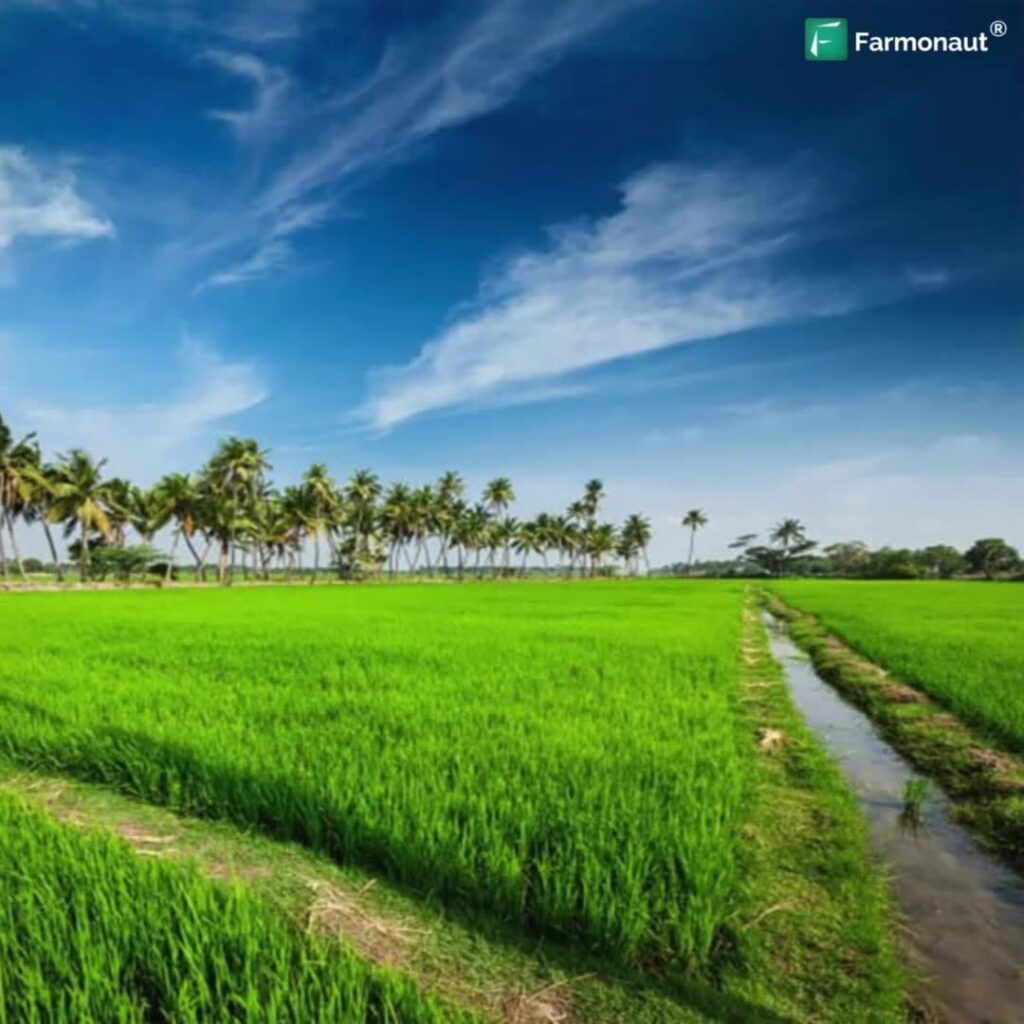The Crucial Role of Soil Organic Carbon in Sustainable Agriculture

At Farmonaut, we understand that the foundation of sustainable agriculture lies beneath our feet – in the very soil that nurtures our crops. Today, we’re diving deep into the world of soil organic carbon (SOC), a critical component of soil health that plays a pivotal role in shaping the future of farming. Join us as we explore the importance of soil organic matter, its impact on crop productivity, and how modern technology is revolutionizing our approach to soil management.
Understanding Soil Organic Carbon
Soil organic carbon is the carbon component of organic materials in soil. It’s a key indicator of soil health and plays a crucial role in the global carbon cycle. But what exactly makes SOC so important?
- Nutrient Cycling: SOC is a primary source of nutrients for plants
- Water Retention: It improves soil structure and water-holding capacity
- Climate Change Mitigation: Soil acts as a carbon sink, helping to reduce atmospheric CO2
- Biodiversity Support: SOC provides a habitat for soil microorganisms
The Importance of Soil Organic Matter
Soil organic matter (SOM) is the organic component of soil, consisting of plant and animal residues at various stages of decomposition. The importance of soil organic matter cannot be overstated. It’s the lifeblood of the soil, influencing its physical, chemical, and biological properties.
Key Benefits of Soil Organic Matter:
- Enhances soil structure and stability
- Increases water infiltration and retention
- Improves nutrient availability and storage
- Supports beneficial soil microorganisms
- Reduces soil erosion and compaction
The Role of Soil Organic Matter in Crop Production
The role of soil organic matter extends far beyond just improving soil structure. It’s a cornerstone of sustainable agriculture, directly impacting crop health and yield. Here’s how:
- Nutrient Supply: As organic matter decomposes, it releases essential nutrients like nitrogen, phosphorus, and sulfur.
- Water Management: SOM improves water infiltration and retention, reducing the need for irrigation.
- Root Development: It creates a favorable environment for root growth and penetration.
- Pest and Disease Resistance: Healthy soils with high SOM support beneficial microorganisms that can suppress plant pathogens.
Carbon in Soil: A Closer Look
The presence of carbon in soil is not just beneficial for agriculture; it’s crucial for global climate regulation. Soil is the largest terrestrial carbon sink, storing more carbon than the atmosphere and all plant life combined.
The Carbon Cycle in Soil:
- Plants absorb CO2 from the atmosphere through photosynthesis
- Plant residues and roots add carbon to the soil
- Soil microorganisms break down organic matter, releasing some CO2 back to the atmosphere
- Some carbon remains stored in the soil for long periods
By managing soils to increase carbon storage, we can mitigate climate change while improving soil health and crop productivity.
The Importance of Soil in Modern Agriculture
The importance of soil in agriculture cannot be overstated. It’s not just a medium for plant growth; it’s a complex ecosystem that supports all life on Earth. In modern agriculture, understanding and managing soil health is crucial for:
- Sustainable food production
- Environmental conservation
- Climate change mitigation
- Economic stability in farming communities
Farmonaut’s Role in Soil Health Management
At Farmonaut, we’re at the forefront of agricultural innovation, providing farmers with the tools they need to monitor and manage soil health effectively. Our satellite-based crop health monitoring platform offers:
- Real-time data insights on soil conditions
- Comprehensive reports on soil health
- AI-driven recommendations for soil management
By leveraging advanced technology, we empower farmers to make informed decisions that promote soil health and sustainable farming practices.
How Farmonaut’s Satellite System Compares to Drone and IoT-based Monitoring
| Feature | Farmonaut Satellite System | Drone-based Monitoring | IoT-based Monitoring |
|---|---|---|---|
| Coverage Area | Large scale (100s to 1000s of hectares) | Limited (10s of hectares) | Very limited (specific points) |
| Frequency of Data | Regular intervals (3-5 days) | On-demand (labor-intensive) | Continuous (limited parameters) |
| Cost-effectiveness | High | Medium | Low (initial investment high) |
| Ease of Use | Very Easy (cloud-based) | Requires skilled operator | Requires setup and maintenance |
| Data Analysis | Advanced AI and ML algorithms | Varies (often manual) | Limited to sensor capabilities |
Practical Tips for Improving Soil Organic Carbon
For farmers looking to enhance their soil health, here are some practical strategies to increase soil organic carbon:
- Implement No-Till or Reduced Tillage: Minimizing soil disturbance helps preserve organic matter.
- Use Cover Crops: These add organic matter to the soil and prevent erosion.
- Rotate Crops: Diversifying crops improves soil structure and nutrient cycling.
- Apply Organic Amendments: Compost and manure can significantly boost soil organic matter.
- Manage Residues: Leaving crop residues on the field adds carbon to the soil.
The Future of Soil Health Management
As we look to the future, the importance of maintaining and improving soil health becomes even more critical. At Farmonaut, we’re committed to developing innovative solutions that help farmers:
- Monitor soil health in real-time
- Implement precision agriculture techniques
- Reduce environmental impact while increasing productivity
- Adapt to changing climate conditions
Our platform is constantly evolving, incorporating the latest advancements in satellite technology, artificial intelligence, and agronomic research to provide the most comprehensive soil health management tools available.
Get Started with Farmonaut
Ready to take your soil health management to the next level? Farmonaut offers a range of solutions tailored to your specific needs:
- Download our mobile app: Android | iOS
- Explore our API services for developers
- Check out our API documentation
To get started with our satellite-based monitoring services, visit our app redirect page.
Subscribe to Farmonaut
Frequently Asked Questions (FAQ)
Q: What is soil organic carbon (SOC)?
A: Soil organic carbon is the carbon component of organic materials in soil. It’s a key indicator of soil health and plays a crucial role in soil fertility, water retention, and climate change mitigation.
Q: How does SOC affect crop productivity?
A: SOC improves soil structure, increases water-holding capacity, enhances nutrient availability, and supports beneficial soil microorganisms, all of which contribute to better crop growth and yield.
Q: Can increasing SOC help combat climate change?
A: Yes, increasing SOC can help sequester carbon from the atmosphere, making soil a valuable tool in mitigating climate change while also improving agricultural productivity.
Q: How can farmers increase SOC in their fields?
A: Farmers can increase SOC by implementing practices such as no-till farming, using cover crops, rotating crops, applying organic amendments, and managing crop residues effectively.
Q: How does Farmonaut help in managing soil health?
A: Farmonaut provides satellite-based crop health monitoring, offering real-time insights into soil conditions and comprehensive reports on soil health. This enables farmers to make informed decisions about soil management practices.
Q: Is Farmonaut’s technology suitable for small-scale farmers?
A: Yes, Farmonaut’s technology is designed to be accessible and cost-effective for farmers of all scales, from small-scale operations to large agribusinesses.
Q: How often does Farmonaut update its soil health data?
A: Farmonaut provides regular updates on soil conditions, typically every 3-5 days, depending on satellite pass frequency and cloud cover.
Q: Can Farmonaut’s technology be integrated with other farm management systems?
A: Yes, Farmonaut offers API services that allow integration with other farm management tools and systems.
Conclusion
The importance of soil organic carbon in sustainable agriculture cannot be overstated. As we face the challenges of feeding a growing global population while combating climate change, maintaining healthy soils rich in organic carbon is more critical than ever. At Farmonaut, we’re committed to providing farmers with the tools and insights they need to manage their soil health effectively, promoting sustainable practices that benefit both agriculture and the environment.
By leveraging cutting-edge satellite technology and AI-driven analytics, we’re helping farmers around the world make informed decisions that optimize their resource use, improve crop yields, and contribute to a more sustainable future for agriculture. Join us in our mission to revolutionize farming through technology and data-driven insights. Together, we can build a more resilient and productive agricultural system that nourishes both people and the planet.
Remember, healthy soils are the foundation of sustainable agriculture. Let’s work together to preserve and enhance this vital resource for generations to come.
